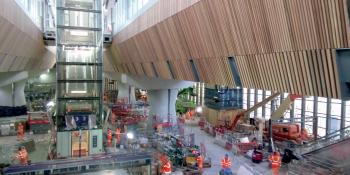
The Institution of Railway Signal Engineer’s (IRSE) long awaited updated Metro Train Control Systems handbook has been published. Collated by IRSE Past President and TfL chief engineer Clair Porter, the 500-page, full colour textbook is authored by a team of train control experts from across the world, and aims to give the reader an understanding of metro railways.
It outlines in detail the principles and applications of modern metro signalling, transitioning to moving block techniques and bringing the integrated Train Control System into focus. The design development is explained together with simulation techniques to optimise the train service frequency.
The book makes extensive use of diagrams and photographs to bring the words to life and contains detailed presentations provided by the major signalling suppliers describing their own technical solutions. Says Ms Porter: ‘The use of case studies illustrates how the generic systems are customised to meet the localised needs of a particular city. These studies also bring to life how the specific Operating Concept will drive the signalling application to reinforce the message that a railway is a system and how it is the culture, processes and equipment that deliver the required performance.
‘This book aims to provide a comprehensive introduction to the subject for the new entrant to the profession, together with a point of reference for the experienced engineer.’
Metro Train Control Systems costs £150 plus postage and packing for non IRSE members and £99.00 plus postage and packing for IRSE members. To order visit www.irse.org/store
IRSE’s ‘TED talks’
The Institution of Railway Signal Engineers (IRSE) has launched its own version of TED talks, IRSE10//. Initially a series of six high quality, studio shot, ten minute talks on aspects of train control, IRSE10/// is the brainchild of IRSE president and Managing Director of Signet Solutions Andy Knight. The aim of the initiative is to raise awareness of train control and communications engineering within the rail industry and to a wider audience.
Mr Knight explains: ‘In today’s fast paced world, many people may not have the time to watch an hour-long technical presentation on a particular subject, but are still keen to learn and find out more. We’ve introduced IRSE 10/// to engage with newcomers to our sector. IRSE10/// also shines a light on train control and communications engineering as part of the Institution’s stated aim to encourage more engineers to consider a career in this exciting field.’
To see a trailer for IRSE10// and the first two episodes, visit https://vimeo.com/irse
IRSE lecture
The IRSE Presidential lecture takes place on 12 January 2023 between 18.00 and 19.30 at the RAF Club in London. Hugh Rochford MIRSE (SNCF Reseau and IRSE's International Technical Committee) and Viriginie Taillandier (SNCF and researcher in the field of connected level crossings) will be presenting a paper on behalf of the IRSE International Technical Committee on autonomous vehicles and level crossings.
Non-members are welcome to attend the fifth in the Institution of Railway Signal Engineers (IRSE) Presidential lecture series on the theme of 'shaping the future' which will be held at the Royal Air Force Club, London W1J 7PY – this event is free to attend but advance booking is essential at www.irse.org/events. All those attending in person or via livelink will be able to participate in the question and answer session with the presenters.
The synopsis of the event is that the car industry has strongly benefited from Innovation and technology. It is now advanced enough to provide automatic warning or direct assistance to car drivers, reducing hazardous behaviour when facing a level crossing and thus significantly reducing fatal accidents. Both connected and automated vehicles are discussed in this paper to show how they can, in the future, interact with a communicating level crossing and increase safety as well as offering an alternative to costly civil works to suppress level crossings.



